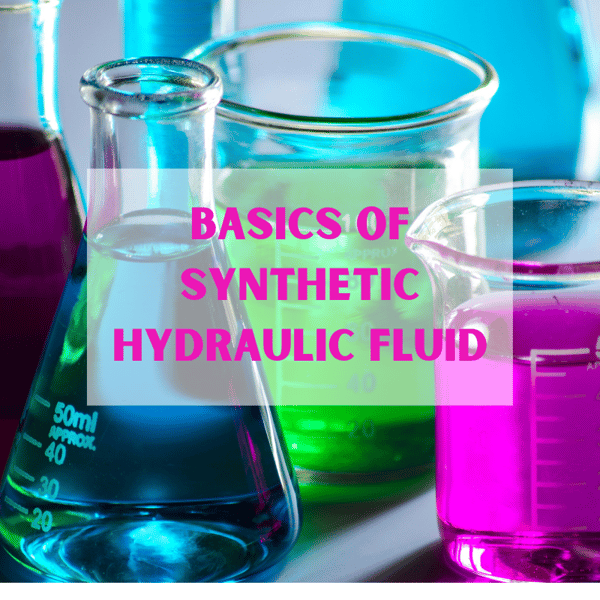In our last blog post, we talked about the three different categories of hydraulic fluid: petroleum-based, synthetic, and water-based. Our focus for this post will be an overview of synthetic hydraulic fluid.

Here are the other Shop Talk Blog posts in this series:
What Makes Synthetic Hydraulic Fluid Different?
Synthetic hydraulic fluid has a chemically produced base instead of a petroleum or water base. By creating the chemical base, hydraulic fluid manufacturers can customize many different aspects of the fluid. Synthetic hydraulic fluid was developed to overcome some of the shortcomings of petroleum-based fluids.
Because synthetic oil can be formulated to meet specific needs, there are a variety of options available for hydraulic systems. This includes situations where food-grade fluids, wear resistance, fire resistance, or high-temperature performance (just to name a few are needed).
Features of Synthetic Hydraulic Fluids
Synthetic hydraulic fluids naturally have a lower coefficient of friction, which is a definite benefit. Low friction means less heat generation and reduced energy losses. This results in a hydraulic system that runs more efficiently and potentially requires less fuel.
Synthetic hydraulic oils are also natural detergents, which means they help keep the surfaces inside your hydraulic system cleaner than standard petroleum-based fluids. They accomplish this by dispersing and suspending contaminants like varnish and sludge so they don’t build up on internal surfaces. They also emulsify water, which creates a suspension-like mixture of oil and water even though they don’t mix. This emulsification, however, can be problematic and result in a higher risk of corrosion.
There are also synthetic hydraulic fluids that are chemically engineered to be biodegradable, which is not possible with petroleum-based fluid. Biodegradability is extremely important in applications where environmental impact must be minimized, and fluid spills could damage local ecology. These types of fluids are often used in agriculture and forestry equipment.
Problems Addressed by Synthetic Hydraulic Oil
One of the issues posed by petroleum-based hydraulic fluid is the development of sludge and varnish, which is worse at high temperatures and pressures. They result from chemical breakdown and form a buildup that can cause hydraulic system failure, of which stuck valves are an excellent example. Synthetic fluids are resistant to this chemical breakdown, even in extreme environments involving heat and pressure.
Another positive aspect of synthetic hydraulic fluid is its high viscosity index (VI), which means that it has stable viscosity over a wide range of temperatures. This is important because fluid experiences a decrease in viscosity at low temperatures, making it thicker, and at higher temperatures, its viscosity reduces, making it thinner. When it becomes too thin, it cannot provide the level of lubrication and protection against wear that your equipment needs. Synthetic oil can be formulated to work over a wide range of temperatures.
Drawbacks of Synthetic Hydraulic Fluid
There are drawbacks to synthetic fluids, of which cost tops the list. However, as is the case with just about everything, better performance means you pay more. That isn’t the only issue with synthetics, though.
Certain synthetic fluids have chemical bases that are incompatible with some seal materials. For some situations, synthetic fluids may simply cause seals to shrink or swell, which can still result in leakage and isn’t good for a hydraulic system. In a worst-case scenario, they can cause complete seal failure. This can lead to catastrophic failure and costly repairs. It’s always important to make sure the synthetic hydraulic oil you choose to use in your equipment is compatible with the seals.
Having physical contact with synthetic fluids can cause skin irritation, but that isn’t the only health-related problem. Some synthetic hydraulic fluids have vapors that can be toxic, and this is especially true of chlorinated fluids and phosphate esters. Fortunately, the concentration of vapors needed for toxicity to be present doesn’t often occur -- unless the liquid comes into contact with flames or very hot surfaces.
Conclusion
Synthetic hydraulic fluid has its pros and cons, and with its improved performance comes higher cost.


